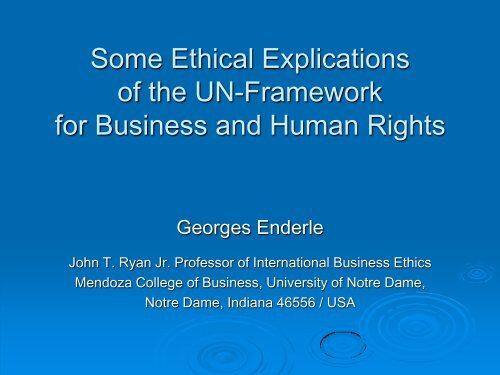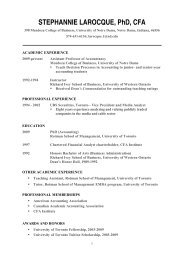to view powerpoint presentation - Mendoza College of Business ...
to view powerpoint presentation - Mendoza College of Business ...
to view powerpoint presentation - Mendoza College of Business ...
You also want an ePaper? Increase the reach of your titles
YUMPU automatically turns print PDFs into web optimized ePapers that Google loves.
Some Ethical Explications<br />
<strong>of</strong> the UN-Framework<br />
for <strong>Business</strong> and Human Rights<br />
Georges Enderle<br />
John T. Ryan Jr. Pr<strong>of</strong>essor <strong>of</strong> International <strong>Business</strong> Ethics<br />
<strong>Mendoza</strong> <strong>College</strong> <strong>of</strong> <strong>Business</strong>, University <strong>of</strong> Notre Dame,<br />
Notre Dame, Indiana 46556 / USA
Introduction: Some cases<br />
Over<strong>view</strong><br />
1. Basic assumptions <strong>of</strong> the UN-Framework<br />
2. Moral obligations <strong>of</strong> securing human rights<br />
3. Determining corporate responsibility for human<br />
rights<br />
4. Does responsibility for human rights conflict with<br />
the self-interest <strong>of</strong> the corporation?
Some cases <strong>of</strong> corporate (ir)responsibilities<br />
for human rights 1995 - 2011<br />
Shell shocked and in the dock<br />
CNPC (China National Petroleum Corporation) in Sudan<br />
Google facing internet censorship in China<br />
Sweatshops in developing countries<br />
Access <strong>to</strong> basic medicines in developing countries
1995-2009:<br />
As Shell<br />
finally<br />
stands trial<br />
for its<br />
alleged<br />
complicity<br />
in the death<br />
<strong>of</strong> Nigerian<br />
activist Ken<br />
Saro-Wiwa,<br />
the case<br />
could have<br />
significant<br />
implications<br />
for<br />
international<br />
corporate<br />
liability
CNPC imports Chinese labor for<br />
Sudan projects rather than employing<br />
local Sudanese citizens<br />
Labor force <strong>of</strong> 10,000 Chinese <strong>to</strong> build<br />
Sudan’s largest oil pipeline<br />
Underbids local firms<br />
Utilizes bribes<br />
Tends not <strong>to</strong> hire Africans<br />
CNPC in Darfur
Environmental behavior in Africa<br />
tied <strong>to</strong> worse <strong>of</strong>fenses<br />
CNPC is accused <strong>of</strong> complicity <strong>to</strong> all sorts <strong>of</strong> behavior.<br />
No active participation, but company conducted business<br />
relationships with the criminal parties (as <strong>of</strong> 2007).<br />
CNPC is largest buyer <strong>of</strong> Sudanese oil; 70% <strong>of</strong> revenue is spent on<br />
military activities, including genocide in Darfur region.<br />
Watchdog groups called for large US mutual funds <strong>to</strong> dump<br />
investments in PetroChina (owned by CNPC) on this account.<br />
Targeted funds include Franklin Temple<strong>to</strong>n, JPMorgan Chase,<br />
Fidelity, and Vanguard.
Freedom or censorship on the Internet
Short his<strong>to</strong>ry:<br />
January 2006: Google announces the launch <strong>of</strong><br />
Google.cn, a self-censored version <strong>of</strong> the original site<br />
Google.com.<br />
January 2010: Google is no longer willing <strong>to</strong> censor<br />
results on its China site.<br />
March 2010: All search requests on Google.cn are now<br />
being redirected <strong>to</strong> Hong Kong arm and not censored<br />
any longer.<br />
July 1, 2010: China renews Google license.
GlaxoSmithKline believes slashing prices and sharing patents will help<br />
the one in six people in the world <strong>of</strong> suffering from a neglected tropical<br />
disease.
Weekly Update – 16 March 2011<br />
<strong>Business</strong> & Human Rights Resource Centre<br />
In this issue<br />
International<br />
Africa<br />
Americas<br />
Asia & Pacific<br />
Europe & Central Asia<br />
Middle East & N. Africa<br />
Lead S<strong>to</strong>ry<br />
Japan nuclear crisis: Reports on responsibility <strong>of</strong><br />
TEPCO (Tokyo Electric Power Company), impacts <strong>of</strong><br />
reac<strong>to</strong>r safety failures on long-term health, pregnant<br />
women, food chain<br />
Justmeans; New America Media; New York Times;<br />
Reuters; Wall Street Journal<br />
link <strong>to</strong> TEPCO website also provided<br />
Japan: Actions by companies <strong>to</strong> help victims <strong>of</strong><br />
earthquake & tsunami<br />
Website:<br />
www.business-humanrights.org<br />
Companies & issues<br />
All latest news<br />
Search<br />
Recent company responses & non-responses<br />
Responded <strong>to</strong> allegations:<br />
ICTI Care Foundation, & fac<strong>to</strong>ries Dongguan Heng Li Tian<br />
Tou Chuang Ying Toys, Tang Xia Yat Hing Plastic and Metal<br />
Manufac<strong>to</strong>ry, Hui Zho Win Merchant Tour Product, re labor<br />
rights abuses in China<br />
Maersk re allegations <strong>of</strong> trafficking workers<br />
Starbucks re worst rating <strong>of</strong> UK c<strong>of</strong>fee chains across 19<br />
ethical categories<br />
Deno Gold on pollution <strong>of</strong> communities in Armenia<br />
Have not sent us a response:<br />
Corriente Resources re alleged human rights abuses in<br />
Ecuador<br />
All responses from past Updates
1. Basic assumptions <strong>of</strong> the UN-Framework<br />
1. Human rights are universally valid moral norms, which, <strong>to</strong>day,<br />
have been recognized worldwide, although not undisputedly.<br />
2. Human rights comprehend all human rights: civil, political,<br />
economic, social, and cultural rights, including the right <strong>to</strong><br />
development.<br />
3. Human rights are minimal moral norms and do not encompass all<br />
relevant moral norms and values.<br />
4. The justification <strong>of</strong> human rights is here not addressed.
All human rights are relevant<br />
• Freedom <strong>of</strong> association<br />
• Right <strong>to</strong> organize and participate<br />
in collective bargaining<br />
• Right <strong>to</strong> non-discrimination<br />
• Abolition <strong>of</strong> slavery and<br />
forced labor<br />
• Abolition <strong>of</strong> child labor<br />
• Right <strong>to</strong> work<br />
Labor rights:<br />
• Right <strong>to</strong> equal pay for equal<br />
work<br />
• Right <strong>to</strong> equality at work<br />
• Right <strong>to</strong> just and favorable<br />
remuneration<br />
• Right <strong>to</strong> a safe work<br />
environment<br />
• Right <strong>to</strong> rest and leisure<br />
• Right <strong>to</strong> family life
All human rights are relevant<br />
• Right <strong>to</strong> life, liberty and security<br />
<strong>of</strong> the person<br />
• Freedom from <strong>to</strong>rture or cruel,<br />
inhuman or degrading<br />
treatment<br />
• Equal recognition and<br />
protection under the law<br />
• Right <strong>to</strong> a fair trial<br />
• Right <strong>to</strong> self-determination<br />
• Freedom <strong>of</strong> movement<br />
Other rights:<br />
• Right <strong>of</strong> peaceful assembly<br />
• Right <strong>to</strong> marry and form a<br />
family<br />
• Freedom <strong>of</strong> thought,<br />
conscience and religion<br />
• Right <strong>to</strong> hold opinions,<br />
freedom <strong>of</strong> information and<br />
expression<br />
• Right <strong>to</strong> political life<br />
• Right <strong>to</strong> privacy
All human rights are relevant<br />
Other rights (continued):<br />
Right <strong>to</strong> an adequate standard <strong>of</strong> living (including food, clothing, and<br />
housing)<br />
Right <strong>to</strong> physical and mental health; access <strong>to</strong> medical services<br />
Right <strong>to</strong> education<br />
Right <strong>to</strong> participate in cultural life, the benefits <strong>of</strong> scientific progress,<br />
and protection <strong>of</strong> authorial interests<br />
Right <strong>to</strong> social security
2. Moral obligations <strong>of</strong> securing human rights<br />
1. All human rights must, as a minimal norm, be secured<br />
completely.<br />
2. Each individual and all organs <strong>of</strong> society must<br />
contribute <strong>to</strong> meet this norm, <strong>to</strong> the extent they are<br />
capable <strong>of</strong>.<br />
Distinguish:<br />
- Subject <strong>of</strong> obligations<br />
- Types <strong>of</strong> obligations<br />
- Criteria <strong>of</strong> assigning obligations
States<br />
Transnational<br />
corporations<br />
and other<br />
business<br />
enterprises<br />
Other Organs<br />
<strong>of</strong> society<br />
Individuals<br />
Subjects and Types <strong>of</strong> Obligations for Securing Human Rights<br />
Respect<br />
Direct: Indirect (no<br />
complicity):<br />
Protect<br />
against<br />
third parties<br />
Remedy Promote
Criteria <strong>of</strong> attributing obligations<br />
1. Strict separation <strong>of</strong> private and public interests: The state is<br />
responsible for the public interests; the other ac<strong>to</strong>rs are<br />
responsible for the private interests.<br />
2. Impact <strong>of</strong> the ac<strong>to</strong>r on the victims <strong>of</strong> violations <strong>of</strong> human<br />
rights.<br />
3. Complicity <strong>of</strong> the ac<strong>to</strong>r: direct, indirect, beneficial, silent, and<br />
structural.<br />
4. Sphere <strong>of</strong> influence <strong>of</strong> the ac<strong>to</strong>r on the victims and<br />
perpetra<strong>to</strong>rs <strong>of</strong> violations <strong>of</strong> human rights.<br />
5. Capability <strong>of</strong> the ac<strong>to</strong>r <strong>to</strong> securing human rights, although<br />
the ac<strong>to</strong>r did not cause human rights violations directly nor<br />
indirectly.
States<br />
Transnational<br />
corporations<br />
and other<br />
business<br />
enterprises<br />
Other organs<br />
<strong>of</strong> society<br />
Individuals<br />
Criterion #1: Strict separation <strong>of</strong> private and public interests<br />
Respect<br />
Direct: Indirect (no<br />
complicity):<br />
Protect<br />
against<br />
third parties<br />
Remedy Promote
States<br />
Transnational<br />
corporations<br />
and other<br />
business<br />
enterprises<br />
Other organs<br />
<strong>of</strong> society<br />
Individuals<br />
Criterion #2 and #3: Direct and indirect impact<br />
Respect<br />
Direct: Indirect (no<br />
complicity):<br />
Protect<br />
against<br />
third parties<br />
Remedy Promote
Criterium #4: Sphere <strong>of</strong> influence <strong>of</strong> the ac<strong>to</strong>r on victim and perpetra<strong>to</strong>r<br />
States<br />
Transnational<br />
corporations<br />
and other<br />
business<br />
enterprises<br />
Other organs<br />
<strong>of</strong> society<br />
Individuals<br />
Respect<br />
Direct: Indirect (no<br />
complicity):<br />
Protect<br />
against third<br />
parties<br />
Remedy Promote
States<br />
Transnational<br />
corporations<br />
and other<br />
business<br />
enterprises<br />
Other organs<br />
<strong>of</strong> society<br />
Individuals<br />
Criterium #5: Capability <strong>of</strong> the ac<strong>to</strong>r<br />
Respect<br />
Direct: Indirect (no<br />
complicity):<br />
Protect<br />
against third<br />
parties<br />
Remedy Promote
3. Determining corporate responsibility for human<br />
rights<br />
What is the corporation?<br />
Production function, nexus <strong>of</strong> contracts, property, economic<br />
mechanism, economic animal, community, organization, corporate<br />
citizen?<br />
The corporation as a moral ac<strong>to</strong>r (not moral person):<br />
Collective entity acting with intention <strong>to</strong> achieve its goal and<br />
impacting on society and nature. Can be held responsible for its acts<br />
and impact.<br />
The corporation as a responsible, moral ac<strong>to</strong>r:<br />
Bipolarity <strong>of</strong> “responsibility” (W. Schulz):<br />
Inner pole: self-commitment originating from freedom.<br />
Outer pole: in worldly relationship (through corporate behavior) with<br />
stakeholders.
States<br />
Transnational<br />
corporations<br />
and other<br />
business<br />
enterprises<br />
Other organs<br />
<strong>of</strong> society<br />
Individuals<br />
UN-Framework for business and rights (2008)<br />
Respect<br />
Direct: Indirect (no<br />
complicity):<br />
Protect<br />
against third<br />
parties<br />
Remedy Promote
Corporate responsibility includes:<br />
1. Corporations have <strong>to</strong> “respect” all human rights worldwide. This<br />
means, they must not cause directly, or be involved directly or<br />
indirectly in, human rights violations.<br />
2. Corporations have <strong>to</strong> exercise “due diligence” <strong>to</strong> examine, on a<br />
regular basis, their corporate strategies and activities with regard <strong>to</strong><br />
all potential and actual impact on human rights and <strong>to</strong> make sure<br />
that all human rights are “respected.”<br />
3. Corporations are not responsible for all types <strong>of</strong> human rights<br />
violations, but “only” for “respecting” them, though in their entirety.
4. Corporate responsibility in conflict with the selfinterest<br />
<strong>of</strong> the corporation?<br />
Self-interest in a narrow sense, in which only short-term and<br />
financial matter “count”: conflict in many situations.<br />
“Enlightened “self-interest, which also includes a long-term<br />
perspective and the benefits <strong>of</strong> all (economic and other) fac<strong>to</strong>rs for<br />
the corporation. “Due diligence” is taken seriously, and the business<br />
case for human rights can be made in many cases.<br />
Can corporate responsibility for human rights go beyond selfinterest?<br />
Yes.<br />
Why?
Thank you
UN-Framework for <strong>Business</strong> and Human Rights<br />
The Corporate Responsibility<br />
<strong>to</strong> Respect<br />
The State Duty <strong>to</strong> Protect<br />
Access <strong>to</strong> Remedies
States<br />
Transnational<br />
corporations<br />
and other<br />
business<br />
enterprises<br />
Other organs<br />
<strong>of</strong> society<br />
Individuals<br />
Ac<strong>to</strong>rs challenged outside the UN-Framework<br />
Respect<br />
Direct: Indirect (no<br />
complicity):<br />
Protect<br />
against third<br />
parties<br />
Remedy Promote






